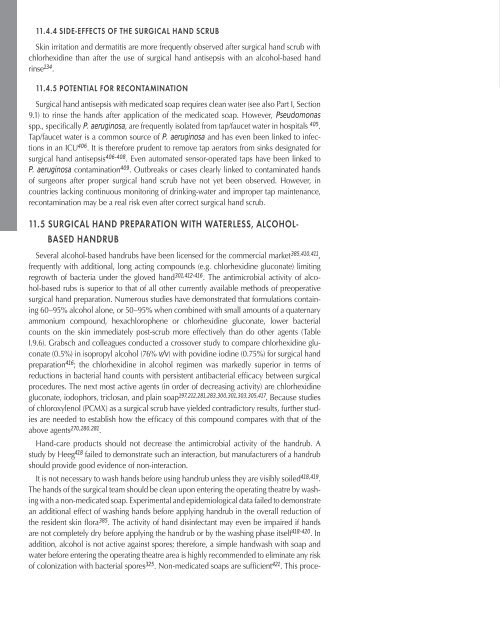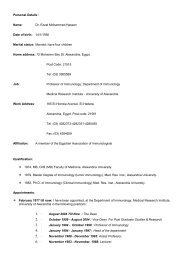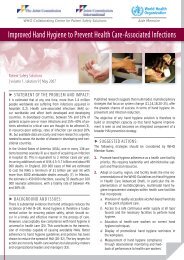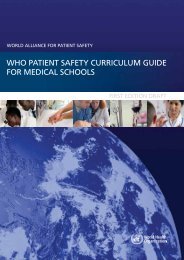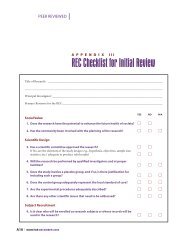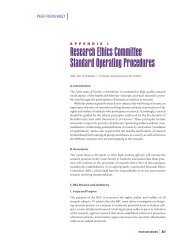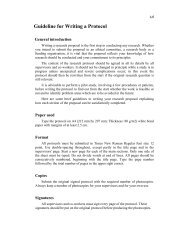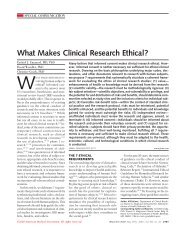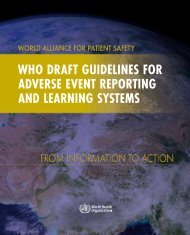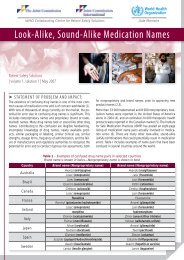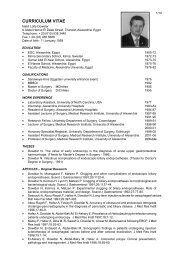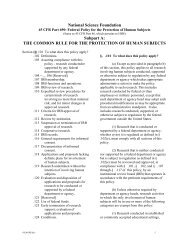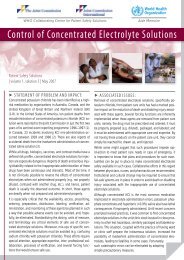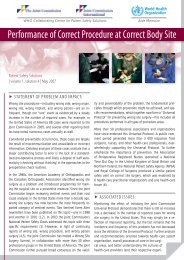Hand hygiene.pdf
Hand hygiene.pdf
Hand hygiene.pdf
You also want an ePaper? Increase the reach of your titles
YUMPU automatically turns print PDFs into web optimized ePapers that Google loves.
11.4.4 SIDE-EFFECTS OF THE SURGICAL HAND SCRUB<br />
Skin irritation and dermatitis are more frequently observed after surgical hand scrub with<br />
chlorhexidine than after the use of surgical hand antisepsis with an alcohol-based hand<br />
rinse 134 .<br />
11.4.5 POTENTIAL FOR RECONTAMINATION<br />
Surgical hand antisepsis with medicated soap requires clean water (see also Part I, Section<br />
9.1) to rinse the hands after application of the medicated soap. However, Pseudomonas<br />
spp., specifically P. aeruginosa, are frequently isolated from tap/faucet water in hospitals 405 .<br />
Tap/faucet water is a common source of P. aeruginosa and has even been linked to infections<br />
in an ICU 406 . It is therefore prudent to remove tap aerators from sinks designated for<br />
surgical hand antisepsis 406-408 . Even automated sensor-operated taps have been linked to<br />
P. aeruginosa contamination 409 . Outbreaks or cases clearly linked to contaminated hands<br />
of surgeons after proper surgical hand scrub have not yet been observed. However, in<br />
countries lacking continuous monitoring of drinking-water and improper tap maintenance,<br />
recontamination may be a real risk even after correct surgical hand scrub.<br />
11.5 SURGICAL HAND PREPARATION WITH WATERLESS, ALCOHOL-<br />
BASED HANDRUB<br />
Several alcohol-based handrubs have been licensed for the commercial market 385,410,411 ,<br />
frequently with additional, long acting compounds (e.g. chlorhexidine gluconate) limiting<br />
regrowth of bacteria under the gloved hand 301,412-416 . The antimicrobial activity of alcohol-based<br />
rubs is superior to that of all other currently available methods of preoperative<br />
surgical hand preparation. Numerous studies have demonstrated that formulations containing<br />
60–95% alcohol alone, or 50–95% when combined with small amounts of a quaternary<br />
ammonium compound, hexachlorophene or chlorhexidine gluconate, lower bacterial<br />
counts on the skin immediately post-scrub more effectively than do other agents (Table<br />
I.9.6). Grabsch and colleagues conducted a crossover study to compare chlorhexidine gluconate<br />
(0.5%) in isopropyl alcohol (76% v/v) with povidine iodine (0.75%) for surgical hand<br />
preparation 416 ; the chlorhexidine in alcohol regimen was markedly superior in terms of<br />
reductions in bacterial hand counts with persistent antibacterial efficacy between surgical<br />
procedures. The next most active agents (in order of decreasing activity) are chlorhexidine<br />
gluconate, iodophors, triclosan, and plain soap 197,212,281,283,300,301,303,305,417 . Because studies<br />
of chloroxylenol (PCMX) as a surgical scrub have yielded contradictory results, further studies<br />
are needed to establish how the efficacy of this compound compares with that of the<br />
above agents 270,280,281 .<br />
<strong>Hand</strong>-care products should not decrease the antimicrobial activity of the handrub. A<br />
study by Heeg 418 failed to demonstrate such an interaction, but manufacturers of a handrub<br />
should provide good evidence of non-interaction.<br />
It is not necessary to wash hands before using handrub unless they are visibly soiled 418,419 .<br />
The hands of the surgical team should be clean upon entering the operating theatre by washing<br />
with a non-medicated soap. Experimental and epidemiological data failed to demonstrate<br />
an additional effect of washing hands before applying handrub in the overall reduction of<br />
the resident skin flora 385 . The activity of hand disinfectant may even be impaired if hands<br />
are not completely dry before applying the handrub or by the washing phase itself 418-420 . In<br />
addition, alcohol is not active against spores; therefore, a simple handwash with soap and<br />
water before entering the operating theatre area is highly recommended to eliminate any risk<br />
of colonization with bacterial spores 325 . Non-medicated soaps are sufficient 421 . This proce-


